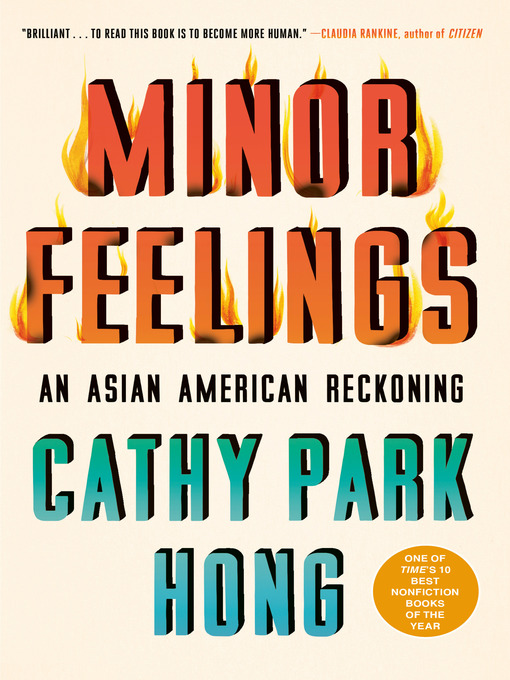
Minor Feelings
An Asian American Reckoning
- اطلاعات
- نقد و بررسی
- دیدگاه کاربران
نقد و بررسی

December 1, 2019
The poetry editor of the New Republic discusses her experiences living and working in a culture hostile to expressions of Asian individuality and identity. In this memoir in essays, Hong (Engine Empire, 2012, etc.) offers a fierce and timely meditation on race and gender issues from her perspective as a Korean American woman. She begins by reflecting on her struggles with depression, which she traces to being forced into the role of model minority. Working harder than everyone else for recognition as an artist, she describes how she watched herself disappear into the "vague purgatorial" no-man's land inhabited by other Asian Americans. The author details how her experiences developing bonds with other talented Asian American women in college taught her to take herself seriously in a world that stereotyped Asians as "math-crunching middle managers." She began developing a greater sense of race consciousness when watching comedian Richard Pryor, which she explores in the essay "Stand Up." His no-holds-barred comedic monologues embodied racialized "negative [and] dysphoric" emotions with which she immediately identified. In turn, Hong attempted to access those "minor feelings" through her own brief foray into stand-up comedy. Like the experiments with language she discusses in "Bad English," the author was seeking a way to speak honestly about her own experiences with racism in an effort to end "white innocence," a concept she addresses sharply in a separate essay. As she sees it, the United States has achieved dominance through "the capitalist accumulation of white supremacy." In "Portrait of an Artist," Hong discusses Asian female invisibility by delving into the groundbreaking work of artist and novelist Theresa Hak Kyung Cha. Seeking to force confrontation with Cha's largely undiscussed murder, Hong examines how Cha died while suggesting that Cha's preoccupation with discursive erasure was a manifestation of revolutionary--rather than "feminine" self-silencing--impulses. Candid and unapologetically political, Hong's text deftly explores the explosive emotions surrounding race in ways sure to impact the discourse surrounding Asian identity as well as race and belonging in America. A provocatively incisive debut nonfiction book.
COPYRIGHT(2019) Kirkus Reviews, ALL RIGHTS RESERVED.

December 9, 2019
In this blistering essay collection, poet Hong (Engine Empire) interrogates America’s racial categories to explore the “under-reported” Asian-American experience. Hong, a child of Korean immigrants, was born in Los Angeles’s Koreatown, but moved from the neighborhood before the 1992 riots upended the area. Her topics include personal experiences, from learning English as a second language and obsessing over her scented Hello Kitty–branded erasers as a child, to mining the repertoire of Richard Pryor as a young woman entering the stand-up scene. She is both angry and wryly funny when examining her struggles with depression, hemifacial spasm disorder, and poetry peers who dismissed her first book as “hack identity politics.” Assessing perceptions of Asian-Americans as “next in line to be white,” as one man tells her, she observes that in fact they have the “highest income disparity out of any racial group” in the country. Her confrontational prose maintains a poet’s lyricism in “The End of White Innocence,” which recalls a childhood “spent looking into the menagerie of white children.” Combining cultural criticism and personal exploration, Hong constructs a trenchant examination of race in America. Agent: PJ Mark, Janklow & Nesbit.

January 1, 2020
Poet and essayist Hong's family history beautifully details how her life and art have been shaped by her Korean American identity. Among the many topics the author explores are the violent history of Korea and how that heritage has impacted generations of her family, her discomfort and confusion navigating her race as a child in the Los Angeles area, and how race affected friendships and mental health throughout her life. She also dissects popular culture, from Richard Pryor's stand-up to the artist Theresa Hak Kyung Cha. Every page is packed with details and reflections on the myriad ways that Americans' lives are shaped by race. The author has a particular talent for bringing a moment to life, inviting readers to confront the raw emotions of a given scene. She does not shy away from complication or bluntness, but presents her truth with all its complexity. VERDICT An extraordinary blend of memoir, cultural criticism, and history that will invite readers from all backgrounds, though especially those who identify as Asian American, to consider the complex relationships between race, family, heritage, and society that shape American lives.--Sarah Schroeder, Univ. of Washington Bothell
Copyright 2020 Library Journal, LLC Used with permission.

Starred review from January 1, 2020
Title aside, nothing is minor about Hong's taut, sharp collection. The award-winning poet's prose debut will elicit comparisons to contemporary race-conscious luminaries?think Claudine Rankine, Ta-Nehisi Coates, and Roxane Gay?but Hong's singular voice expresses both reclamation and declaration: For as long as I can remember, I have struggled to prove myself into existence . . . Asian Americans inhabit a vague purgatorial status: not white enough nor black enough. Seven stupendous essays mark her journey toward claiming agency. She exposes collective Asian American history and spotlights today's racially charged complicity in United." She channels Richard Pryor's raw energy and the manipulations of L.A.'s 1992 race riots in Stand Up. She unmasks white fragility in End of White Innocence, and she subverts language in Bad English." Hong reveals intimate female friendships in An Education, confronts the brutal rape and murder of iconic artist Theresa Hak-Kyung Cha in Portrait of an Artist, and refuses to be grateful in The Indebted. L.A.-born to Korean immigrant parents, Hong creates a fierce amalgamation comprised of careful memoir, radical history, sociopolitical treatise, and revolutionary call-out. Being woke, she notes, is already a hashtag that's now mocked, when being awake is not a singular revelation but a long-term commitment fueled by constant reevaluation. Apologetic no more, Hong proves, We're everywhere now. (Reprinted with permission of Booklist, copyright 2020, American Library Association.)




دیدگاه کاربران